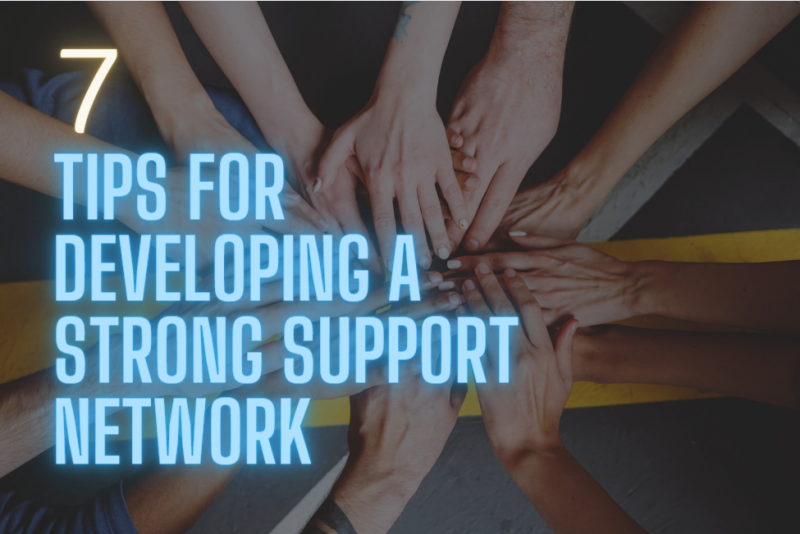Introduction
You’re not alone on your journey to growth. Building a strong support network is key, and we’re here to guide you.
In this article, you’ll learn how to establish, nurture, and maintain meaningful relationships. We’ll even show you how to leverage social media for networking.
So, don’t let challenges deter you, let’s build your personal and professional network together.
Dive in, and discover the power of relationships in your growth.
Understanding the Importance of Support Networks
While you might think you can manage everything on your own, it’s crucial to understand that having a strong support network can significantly enhance your ability to grow and succeed. You’re not an island, and trying to handle everything independently can lead to burnout. It’s not a sign of weakness to lean on others; rather, it’s a smart strategy that can propel you towards your goals faster.
A robust support network can provide you with valuable advice, different perspectives, and emotional support when you’re facing challenges. They’re your sounding board, your cheerleaders, and sometimes, your reality check. They can provide you with resources or connections you mightn’t have on your own.
Think about it. Isn’t it easier to solve a problem when you’ve got a team brainstorming solutions with you? Isn’t it more comforting to know that you’ve got people who care about your wellbeing and want to see you succeed? That’s the power of a support network.
Building Relationships: Where to Start
To kick-start your journey towards building a solid support network, you’ll need to focus on fostering relationships, both within and outside your immediate circle. Establishing a strong connection doesn’t happen overnight, so let’s break it down into manageable steps.
Begin by making genuine connections. Reach out to your colleagues, family, and friends. Be open about your aspirations, goals, and challenges. People can’t support you if they don’t know what you’re up against. But remember, relationships are a two-way street. You’ll need to reciprocate by showing interest in their lives too.
Next, seek out new connections. Join clubs, attend community events, or participate in online forums that align with your interests. You’ll meet like-minded individuals and expand your network.
Finally, don’t forget to nurture your relationships. Regularly check in with your contacts, be there when they need support, and celebrate their successes. It’s these small gestures that build lasting connections.
Nurturing Connections for Long-Term Bonds
Now, let’s delve into the art of nurturing your connections to forge long-term bonds.
It’s not enough just to make connections; you’ve got to maintain them too. That’s where nurturing comes in.
Think of your relationships as plants in a garden. You can’t just plant a seed and expect it to grow without water, sunlight, and care. You’ve got to tend to it, nurture it, and give it the sustenance it needs to thrive.
Likewise, your relationships need attention, understanding, and respect to flourish. Start by showing genuine interest in other people’s lives. Ask about their day, their interests, their dreams. Keep in touch, even if it’s just a quick text or email.
When conflicts arise, handle them with grace and patience. Remember, it’s not about who’s right or wrong, but about understanding and resolving the issue at hand.
In the end, it’s the small acts of kindness, empathy, and respect that make a big difference. These are the things that will help you nurture your connections and forge long-term bonds.
The Art of Reciprocity in Relationships
In the spirit of nurturing your connections, understanding the art of reciprocity in relationships becomes equally essential for its profound influence on developing a strong support network.
Reciprocity is about giving and receiving – it’s the mutual exchange of kindness, support, and love. It’s not purely transactional; it’s about creating a balance of give-and-take that fosters mutual respect and appreciation.
You might wonder how to cultivate reciprocity in your relationships. Start by being generous with your time and energy. Help others when they’re in need without expecting immediate payback. However, don’t forget to allow others to give back to you. It’s easy to forget that accepting help is as important as offering it. By doing so, you communicate to them that their support is valued, and you strengthen the bond of reciprocity.
Leveraging Social Media for Networking
Social media isn’t just for fun; it’s a powerful tool you can use to grow your support network.
You’ll need to select the right platforms, interact effectively online, and build a strong digital presence.
Choosing Right Platforms
Before delving into the myriad of social media platforms, it’s crucial for you to identify which ones will best serve your networking needs. Your choice should align with your target audience.
For instance, LinkedIn is ideal for professional connections, while Instagram might be perfect if your focus is on visuals. Facebook is a versatile platform, suitable for a wide range of networking activities.
Additionally, don’t overlook platforms like Twitter for quick, timely exchanges, or YouTube for sharing more detailed content. However, don’t spread yourself too thin. It’s better to be active and engaged on a few platforms than barely present on many.
Effective Online Interaction
After selecting the right platforms, you’ll need to master effective online interactions to truly leverage social media for networking.
Begin by crafting a compelling profile that accurately represents you and your interests. Use your authentic voice and avoid generic descriptions.
Be proactive. Don’t just wait for connections to come to you, seek them out and engage in meaningful discussions. Comment on posts, share valuable content, and start conversations.
Remember, it’s not just about quantity, but quality. Building a few strong, beneficial relationships is better than having numerous shallow connections.
Don’t be afraid to showcase your expertise, but remember to listen and learn from others too. Balancing self-promotion with genuine interaction is key to effective online networking.
Building Digital Presence
Start building your digital presence by strategically leveraging social media for networking. Don’t underestimate the power of platforms like LinkedIn, Twitter, and Facebook. They’re not just for sharing photos or updates about your life. They can be potent networking tools if used wisely.
Connect with professionals in your field, participate in discussions, and share relevant content. It’ll boost your visibility and credibility. Likewise, use Instagram or Pinterest if you’re in a creative industry. They’re excellent platforms for showcasing your work.
But remember, it’s not about the number of followers, it’s about quality connections. Engage authentically, contribute value, and show genuine interest in others. That’s how you build a robust digital network that supports your growth.
Balancing Personal and Professional Networks
Balancing your personal and professional networks is essential in creating a robust support system. It’s important to maintain professional boundaries while still nurturing your personal connections.
Now, let’s discuss how to achieve this balance and why it’s crucial to your growth.
Maintaining Professional Boundaries
In managing your support network, it’s crucial that you maintain clear boundaries between your personal and professional relationships. Keep your work life separate from your personal life to avoid conflicts.
It’s important to remember that while you can be friendly with your professional network, it’s not the same as being friends. Don’t let personal issues bleed into your professional life.
Similarly, keep work issues at work. Cultivate a professional demeanor and always treat your colleagues with respect. This will aid in avoiding misunderstandings and potential conflicts.
Moreover, it’s essential to respect others’ boundaries as well. You’re there to work and grow professionally, and keeping a balance is key to maintaining a healthy work environment.
Nurturing Personal Connections
How do you nurture your personal connections while also maintaining a solid professional network? It’s a delicate balancing act. You’ve got to invest time and effort into both.
For your personal connections, prioritize regular check-ins and quality time. Be there for their highs and lows, and show genuine interest in their lives.
For your professional network, stay engaged by joining professional groups and participating in relevant discussions. Share useful resources and offer your expertise when appropriate.
Remember, it’s not about choosing one over the other. Both personal and professional relationships play crucial roles in your growth. So, balance is key.
Maintaining Relationships Amidst Challenges
Despite the trials you may face, it’s crucial to keep your relationships strong as part of your support network. Life’s challenges can strain even the most robust connections, but it’s how you handle these obstacles that truly matters.
Firstly, it’s important to recognize that everyone encounters difficulties, and it’s okay to lean on your network during these times. Don’t shy away from sharing your struggles. They can offer a fresh perspective, advice, or simply a comforting presence.
Secondly, practice empathy and patience. Understand that those in your network also have their battles. Be there for them just as they’re for you.
Thirdly, don’t let disagreements fester. Address conflicts directly and promptly, with respect and openness. Ignoring issues or resorting to blame can only poison a relationship.
Lastly, make time for those who matter. Regular communication is key to maintaining connections. It shows you care and are invested in the relationship.
Frequently Asked Questions
How Can I Handle Relationships That Become Toxic or Detrimental to My Growth?
Handling toxic relationships can be tough. First, identify what’s harmful. You’ve got to be honest about how you feel.
Next, set boundaries. It’s okay to protect your mental health. If it doesn’t work, consider distancing yourself. You’re allowed to leave relationships that harm you.
Lastly, seek professional help if it’s overwhelming. Remember, it’s crucial to surround yourself with positive, supportive people for your personal growth.
What Are Some Ways to Manage My Time Effectively When Building and Maintaining Multiple Relationships?
To manage your time effectively while building and maintaining relationships, it’s crucial to prioritize. Decide who’s most important and allocate your time accordingly.
Use tools like calendars or apps to schedule and track time spent with others.
Don’t forget to set boundaries and say ‘no’ when necessary. Remember, it’s okay to take time for yourself, too.
Healthy relationships shouldn’t consume all your time. Balance is key.
Can Introverts Build a Strong Support Network? if So, How?
Absolutely, as an introvert, you can build a strong support network. Start by focusing on quality, not quantity. It’s about nurturing a few deep, meaningful relationships.
Use your listening skills, people appreciate someone who truly hears them. Also, remember it’s okay to need alone time. Balance socializing with downtime.
Online communities can be a great resource too. You’re not alone in this, many introverts have successfully built strong networks.
How Can I Incorporate My Support Network in My Personal Development Plans?
Incorporating your support network into your personal development plans can be highly beneficial. Start by sharing your goals with them. They can offer advice, provide accountability, and celebrate your successes with you.
Don’t hesitate to ask for help when you’re struggling. Remember, it’s not a burden; they’re there to support you.
Plus, their unique perspectives can offer valuable insights you mightn’t have considered.
How Can I Deal With Rejection or Disappointment When Trying to Establish Connections in My Network?
Dealing with rejection or disappointment when trying to establish connections can be tough. Remember, it’s part of the process. Don’t take it personally. Instead, use it as a learning opportunity.
Reflect on what you could’ve done differently and apply it next time. Stay positive, keep reaching out and you’ll eventually build a strong network. It’s all about persistence and resilience.
You’ve got this!
Conclusion
So, you’ve got the tools for building a robust support network. Remember, it’s all about nurturing long-term bonds, balancing personal and professional connections, and maintaining relationships even when the going gets tough.
Don’t forget to give back, too – reciprocity is key. And leverage social media to your advantage.
With these tips, you’re well on your way to developing a strong network that’ll support your growth.





